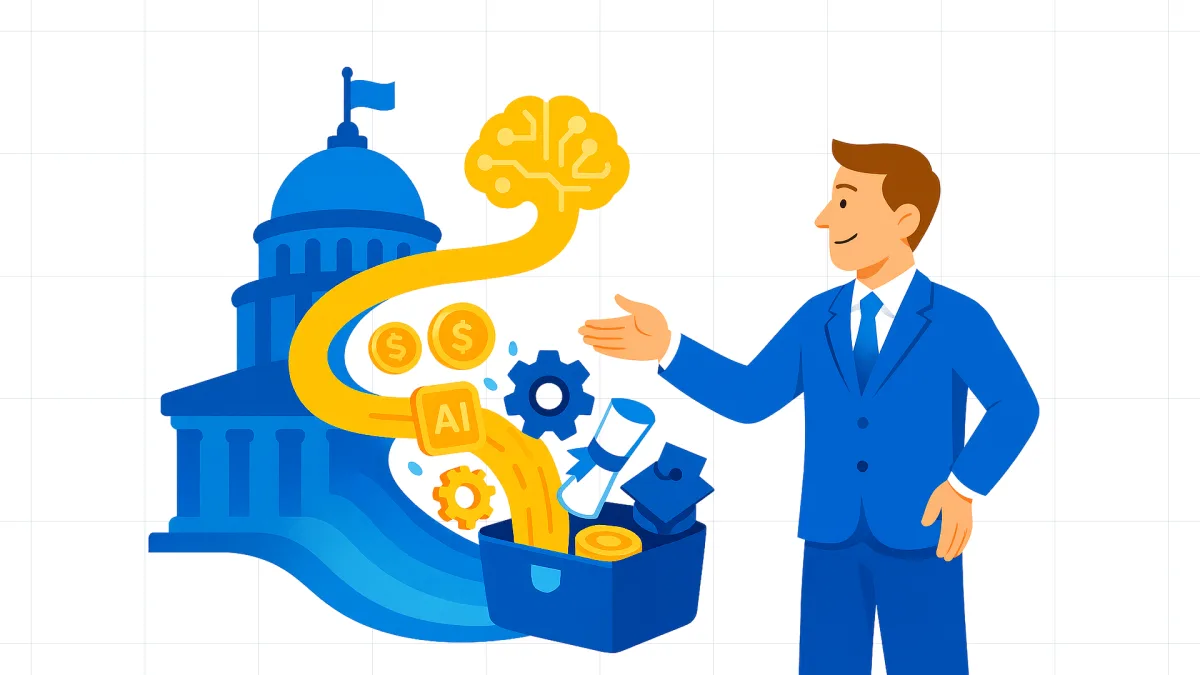America's AI Action Plan - HR’s Blueprint for the AI-Ready Workforce
The White House just gave HR its biggest AI opportunity yet. It's not regulation—it’s an invitation. Are you ready to lead the shift?

I’ve read the recent Whitehouse America’s AI Action Plan and think there is another incredible opportunity for HR to continue to lead the AI transformation. This time with some help.
For HR leaders, this isn't just another government regulation to monitor; it's a call to action.
The "America's AI Action Plan" outlines a "worker-first" philosophy, treating AI not as a replacement for human ingenuity but as a powerful complement.
AI in HR Today
with Anthony Onesto
Subscribe for exclusive insights from Anthony Onesto, Chief People Officer at Suzy, and learn how AI is reshaping HR, enhancing employee engagement, and driving business success.
TOGETHER WITH
I have written about how we in the Human Resource profession are at the epicenter of this transformation, tasked with moving our organizations from reactive adaptation to proactive, strategic planning.
The future of work is not just about adopting AI tools, but about cultivating the human potential that will thrive alongside them.
The federal government is laying the groundwork, creating a wealth of opportunities for those in HR to seize.
Key agencies, including the Department of Labor (DOL), Department of Education (DoE), National Science Foundation (NSF), and Commerce (DOC), are prioritizing AI skill development in their funding streams.
This means your learning and development budgets can be augmented and aligned with national priorities.
On top of that, the Treasury, through Section 132 IRC, is offering tax incentives for AI training, making it even more financially viable for companies to invest in their people.
For strategic workforce planning, the DOL is establishing an AI Workforce Research Hub, which will be an invaluable resource, providing data to help us identify and address future skill gaps.
The "America's AI Action Plan" rightly focuses on the foundational AI infrastructure and the "new collar" jobs that will be essential to it, from electricians to HVAC technicians. This is a massive shift from the purely white-collar focus we often see.
The federal push for national skill frameworks and the emphasis on Registered Apprenticeships as a primary talent pipeline is a game-changer.
As HR professionals, we must engage with vocational schools, community colleges, and industry partners to build these specialized talent pools.
The days of simply hiring from a small pool of university graduates are over. The solution to the high demand and low supply of tech talent is to build a pool of talent right here in the U.S. by retraining people in areas hit hard by economic downturns.This approach, where companies and governments partner to create local talent networks, is an investment in both your company's future and the economic vitality of a community.
So, what are the practical, actionable steps we can take today?
- Leverage that federal data to perform proactive workforce planning and skill gap analysis. Instead of waiting for a skill shortage to hit, anticipate it and prepare.
- Design agile, modular, and rapid retraining programs. Repetitive, non-strategic tasks will be automated, so we need to focus on what humans do best: creativity, innovation, and emotions.
- Rethink talent acquisition by moving beyond traditional hires and exploring internal talent mobility models. Who in your company has the potential to move into a new, "AI-enhanced" role?
- Don't go it alone. Foster public-private partnerships to co-create training solutions that benefit both your business and the broader community.
In this new era, HR's role is more critical than ever. We are no longer just administrators; we are the architects of the AI workforce revolution.
By operationalizing the national AI agenda, embracing adaptability, and making continuous investments in human capital, we can secure a competitive advantage for our organizations.
AI in HR Today
with Anthony Onesto
Subscribe for exclusive insights from Anthony Onesto, Chief People Officer at Suzy, and learn how AI is reshaping HR, enhancing employee engagement, and driving business success.
